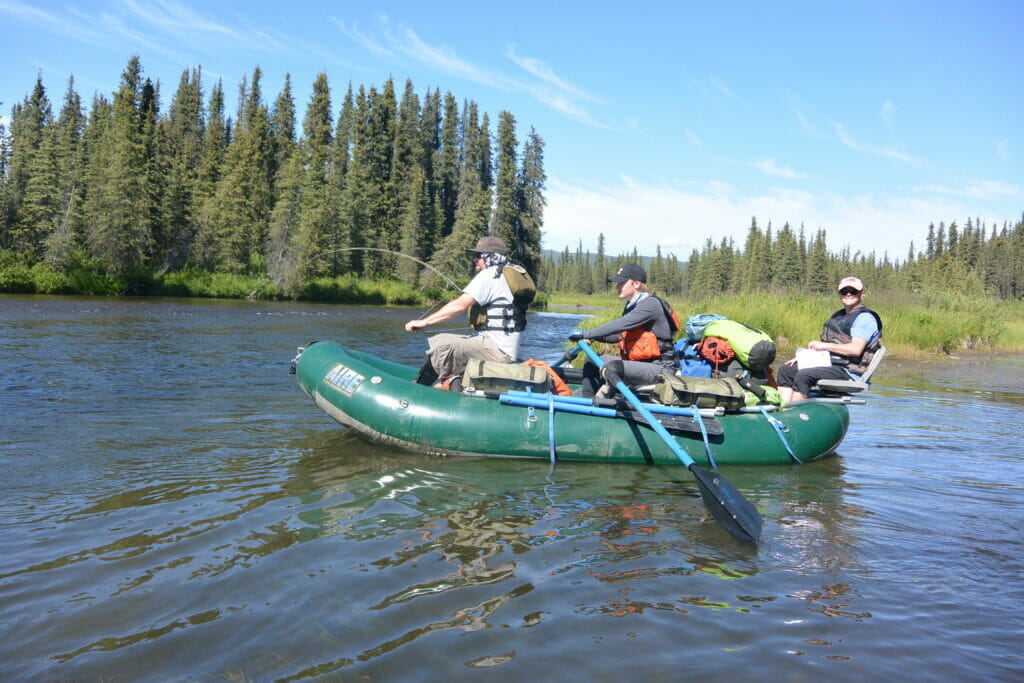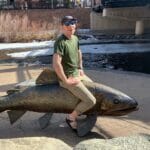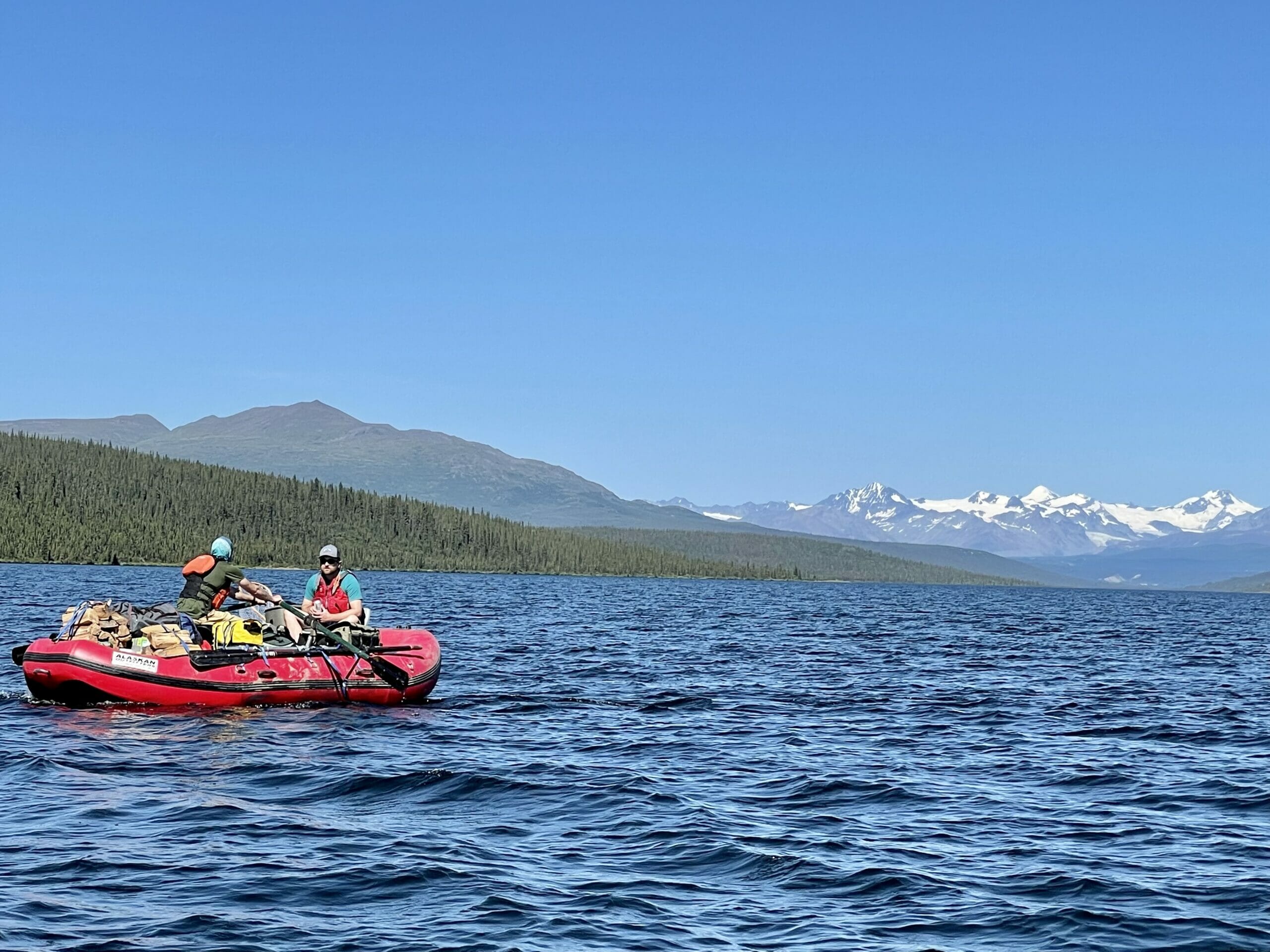Eric and Ryan rowing across Paxson Lake with Gulkana Glacier in the distance. Photo by Chad Gage.
Five years ago, I watched Wyatt, not even a teenager yet, take the oars for the first time on my initial foray to the Gulkana River. During subsequent trips I have been privileged to observe his skills solidify and his thirst for more take hold. It wasn’t long before he was on the sticks for the majority of the float, and excitedly asking, “Can I row the canyon next year?” while tugging on his dad’s sleeve around the campfire. This has been one of many progressions that has marked my own passage of time spent in Alaska.
How do you quantify time? Distilled to cycles of sleep, simplified to the circulation of clock arms and tracked by planetary rotations and with a knack for moving quickly, it is always in short supply and only moves one direction. Time’s progression is dependable; the clock continues to tick as a I type and you read. We live in confines of time’s grip, a residency with a temporary nature often forgotten but deeply reaffirmed by the passage of friends.
All we have is the present, a reality that deserves more conscious comprehension and less lip service. Life on earth, or my life on earth at least, is marked with noteworthy occurrences that illuminate the passage of time, remind me of my own finite existence in this body and make me sit back, a smirk of content across my face.
Signaling another year’s passing, the annual float down the Gulkana River, one of Alaska’s many Wild and Scenic rivers, is one such noteworthy occurrences, with no place better to be present in the company of friends than in the wild.
Nearly a full cycle around the sun has passed and here we are, back at the edge of Paxon Lake, digesting our knowledge of what’s downstream and entertaining the question, “Does the lake seem high to you?” as if it really matters. We have no intentions of loading the rafts back in the rig. Ryan, my boat buddy, and latest addition to the revolving cast of Gulkana flotilla characters, dips the oars and thrusts us onto Paxson Lake and into our 2021 odyssey. The familiar views appease my eyeballs — this landscape, its wildness, fuel the source of calmness I turn to when life demands. My heartbeat settles as my internal clock resets itself to “river time.”
Caught by the flow, our 2021 Gulkana crew, is committed to the adventure below.
The Gulkana River is a vein of clean water originating from the Gulkana Glacier that traces a glacier scar to the downstream Copper River, a bonafide salmon factory of a river system. Birthed by one of the many glacial remnants of a distant period of time, the Gulkana is host to wild pacific salmon, a thriving population of Arctic grayling, and, interestingly, the most northern population of native rainbow trout.
A wild river in the presence of glaciers and the vicinity of volcanoes, the region has a timeless feel to it and, in many ways, its existence is as reliable as time itself. The wild characteristic of their natural existence has proven fragile however, fleeting at the hands of humans as demonstrated elsewhere.
“Pristine habitat” and “native fish” are anthropogenic accolades underscoring the extent of our impacts to fish and wildlife, highlighting the limited ecosystems left that function as naturally intended.
The Gulkana River is listed as a Wild and Scenic river, a designation that offers basic protections to preserve its future, a decision I passionately applaud. Transecting the traditional lands of the Ahtna people, this river was special long before the Bureau of Land Management and sweaty suits on the urbanized shores of the Potomac River in D.C. recognized its merits. It is a region of immense cultural value. In my mind, that is the most important land recognition we hunters, anglers and tourists should understand. The intact nature of this wild place is thanks to the Indigenous communities who call these lands home and my current access and enjoyment of them is a complex topic. This isn’t simply just the case with this slice of Alaska, but the wild lands and waters you also roam.
The technical challenge of the Gulkana River peaks in “the Canyon”, a class III-IV run with a reputation. Tensions rise as the river corridor restricts and the waters babble grows to a roar. Among the precise maneuvers that need to be made to achieve safe passage are navigating a particularly narrow slot and powering over a small waterfall and past its powerful hydraulic hold, both of which routinely prove troublesome to boaters. Though far from the roughest white water Alaska has to offer, it can be character building to say the least.
With the ceremonious passing of the rower’s glove to his 16-year-old son, Chad relinquished his rowing obligations with a smile and only a faint hint of concern. A rite of passage unparalleled to any found in front of living room TVs or at suburban shopping malls, Wyatt began the lonely walk to the top of the rapid.
Of course, Wyatt cleaned the canyon on his first try, without fault. I wasn’t surprised, but I was still elated. Undoubtedly a highlight from the trip and a noteworthy moment in the passage of time. After his son’s successful, clean run through the canyon, well, Chad is now retired from rowing.

The Gage family in standard formation: Chad fishing from the bow, Wyatt in the rowers seat and Erin in the stern navigating the flotilla. Photo by Eric Booton.
The “young’un”, half my age, who’s been running wild rivers longer than I have, is already padding his resume and scheming up plans to embark with his high school friends for an adventure all their own. The latest monumental mark in the passage of time, and one that will be tough to top.
Wild places are irreplaceable and increasingly rare. They are gift to share with others and offer up experiences of no greater prize, as there is no better place to be present in the company of friends and family.
Not all Alaskans, Americans or visitors are committed to the flow of a wild river or to being immersed in wilderness, but those who are may find themselves engulfed in the quality of lived experiences that mark time and add some of the special zest to life.
One doesn’t necessarily need to travel to established wild-and-scenic locations to experience wild-and-scenic values. These invaluable experiences can be found in any location near and dear to your heart in the company of those who add meaning to your life. However, if you can do it in remote Alaska, walking riverbanks peppered in bear paw prints and floating over spawning beds of 50-pound wild chinook salmon participating in the annual mating dance, I would recommend it.
Finally, love your trip buddies. You’re sharing this moment in time together.
Eric Booton is the Eklutna Project Manager & Sportsmen Coordinator for Trout Unlimited’s Alaska Program. He resides on the trout streams and snowy ridges of Southcenral, Alaska, still smirking from his latest adventure



